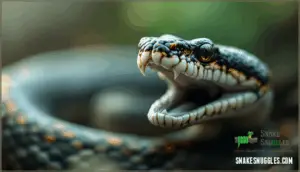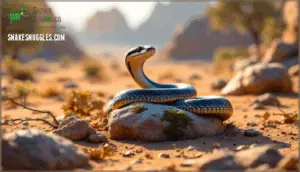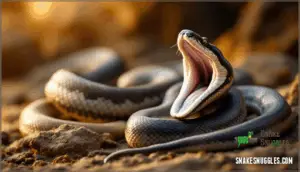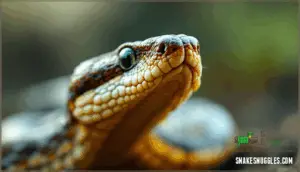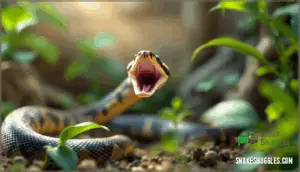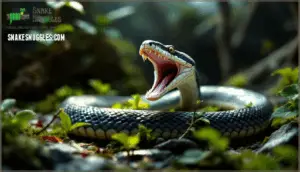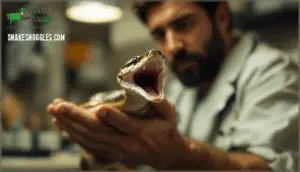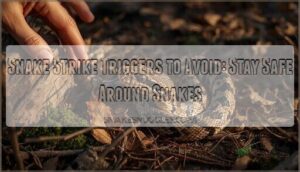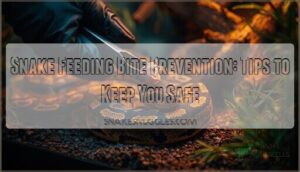This site is supported by our readers. We may earn a commission, at no cost to you, if you purchase through links.

Snakes yawn for several practical reasons—realigning their jaws after a meal, clearing their airways, or regulating body temperature—though frequent yawning can sometimes signal health concerns that need attention.
Understanding the difference between routine mouth gaping and warning signs helps you provide better care and know when it’s time to consult a veterinarian.
Table Of Contents
- Key Takeaways
- Why Do Snakes Yawn
- Reasons for Yawning in Snakes
- Is It Normal for Snakes to Yawn
- What Does It Mean When a Snake Yawns
- Should You Be Concerned About Your Snake’s Yawning
- How to Care for a Snake That Yawns Frequently
- When to Seek Veterinary Help for Your Snake
- Frequently Asked Questions (FAQs)
- Do snakes yawn when they’re tired?
- Why is my ball python yawning so much?
- What does it mean when snakes open their mouths?
- Why do snakes stretch their mouths?
- Do all snake species yawn equally?
- Is yawning contagious among snakes?
- Can yawning be a sign of aggression in snakes?
- Do snakes yawn more during certain times of the year?
- Is there a difference in yawning behavior between captive and wild snakes?
- Can snakes yawn to communicate with other snakes?
- Conclusion
Key Takeaways
- Snakes yawn primarily for jaw realignment after meals, airway clearing, and thermoregulation—behaviors that are typically normal and tied to their unique jaw mechanics and respiratory needs.
- Occasional yawning reflects routine maintenance, but persistent gaping paired with wheezing, mucus discharge, or lethargy signals respiratory infection or mouth rot requiring immediate veterinary care.
- Environmental stressors like improper temperature gradients, humidity levels, or ventilation can trigger excessive yawning, so monitoring enclosure conditions helps distinguish healthy behavior from stress responses.
- Different snake species display varying yawning patterns based on their anatomy and feeding habits, with captive snakes often yawning more frequently due to environmental factors compared to their wild counterparts.
Why Do Snakes Yawn
When you spot your snake with its mouth stretched wide open, you might wonder if something’s wrong. This behavior, which looks a lot like a yawn, happens for several distinct reasons that range from perfectly normal to worth monitoring.
Let’s walk through what triggers this mouth-gaping behavior and what each scenario means for your snake’s well-being.
Natural Behavior in Snakes
Snakes yawn as part of their everyday routine, and it’s about as normal as a dog wagging its tail—though for entirely different reasons. This animal body language fulfills several functions tied to reptile biology and ecology. Here’s what drives snake yawning:
- Jaw realignment: After meals, snakes yawn to adjust their flexible jaw structure back into place.
- Sensory scanning: Wild snake behavior includes yawning to sample airborne chemicals for prey detection.
- Pre-shed preparation: Snakes often yawn before shedding, loosening facial skin in their snake habitat.
Theories and Explanations for Yawning
When you watch your snake open its mouth wide, scientists have pieced together several explanations rooted in snake behavior and physiology. Jaw realignment stands out as a primary driver—those flexible jaw mechanics need regular adjustment after meals or manipulation. Thermoregulation also plays a role, as mouth gaping promotes heat dissipation through convection flows in the throat.
Studies suggest chemoreception improves when yawning brings the vomeronasal organ into better contact with environmental cues. Some researchers propose social signaling or defensive behavior functions, where yawning communicates internal states to nearby threats. Respiratory function benefits from the airway expansion, especially after eating blocks normal breathing pathways.
Understanding the reasons behind snake behavior, including snake defense mechanisms, can help owners better care for their pets.
| Theory | Primary Function |
|---|---|
| Jaw Realignment | Repositions flexible jaw structure |
| Thermoregulation | Dissipates cranial heat through airflow |
| Chemoreception Enhancement | Amplifies chemical signal detection |
Yawning as a Sign of Relaxation
While jaw mechanics and heat regulation explain much of the yawning you observe, your snake might also yawn simply because it feels safe and settled in its environment. Relaxed snakes often exhibit this calming signal when stress levels drop—think of it as their way of unwinding after you’ve created a calm environment with proper hiding spots and stable conditions.
You’ll notice the difference between defensive behavior and genuine snake calming by watching body language: a content snake shows loose musculature and unhurried movements alongside occasional yawning, signaling your snake care efforts support natural stress reduction.
Yawning After Eating
Just as a relaxed snake might yawn to signal comfort, you’ll often see your pet gape its mouth right after swallowing prey—this time for an entirely different reason. Post-meal behavior involves realigning displaced jaw bones after they’ve stretched to accommodate large prey. Your snake’s feeding habits require this jaw mechanics adjustment because the quadrate bones must snap back into proper position.
Here’s what’s happening during snake yawning after meals:
- Jaw realignment restores mandible positioning
- Airway clearance reopens the glottis
- Digestive issues monitoring begins
- Feeding techniques assessment occurs naturally
This defensive behavior differs from snake health concerns.
Reasons for Yawning in Snakes
When you see your snake opening its mouth wide, you’re witnessing a behavior that fulfills several important functions. While it might look like a simple yawn, this mouth gaping actually meets specific physiological needs that are essential to your snake’s daily life.
Let’s explore the main reasons why snakes yawn and what each one means for your pet’s health.
Stretching The Mouth and Jaws
Snakes don’t just open their mouths to eat—they actually need to stretch and realign their jaws regularly, much like you might roll your shoulders after sitting too long. This mouth gaping helps reset the flexible jaw joints that allow them to swallow prey whole.
You’ll often see jaw realignment happening after a meal, but snake yawning can occur anytime their anatomy needs a quick adjustment to keep everything working smoothly.
Regulating Body Temperature
Because snakes are cold-blooded, thermoregulation becomes a delicate balancing act. Yawning helps them manage temperature control through several mechanisms:
- Increased blood flow to the head draws cooler arterial blood toward the brain, supporting brain cooling.
- Inhalation of ambient air allows direct heat exchange through respiratory passages.
- Mucosal evaporation in the mouth and throat promotes thermal balance during temperature shifts.
You’ll notice yawning frequency increases as ambient temperatures rise, then drops when conditions stabilize near their preferred range of 28–32°C. This behavior is related to the brain cooling theory that explains why yawning occurs in many species.
Clearing The Airways
When your snake opens its mouth wide and holds it there, you’re watching a practical solution to a breathing challenge that comes with swallowing prey whole. Large meals can temporarily compress the airway, restricting oxygen flow and disrupting normal breathing patterns.
Mouth gaping restores respiratory system health by clearing airway obstruction and reestablishing proper breathing. This jaw mechanics in snakes behavior guarantees adequate oxygen delivery while food passes through the throat, supporting overall respiratory health.
Adjusting The Jaws
Your snake’s yawn is more than a stretch—it’s a careful reset. Jaw alignment is vital for their unique anatomy because flexible jaws let them take in large prey.
With each yawn, jaw movement shifts bones back into place—a reset of the jaw structure. This mouth stretching maintains healthy jaw mechanics in snakes, securing strong, future jaw adjustment.
Is It Normal for Snakes to Yawn
If you’ve seen your snake yawn, you’re not alone—it happens more often than you might think. Different types of snakes have their own patterns, and some are more likely to do it than others.
Let’s break down what you can expect with a few common species.
Frequency of Yawning in Snakes
Ever notice how some reptiles seem to stretch their jaws more than others, almost as if they’re letting out a silent opinion on their day? Yawning frequency can change with stress, recent meals, or temperature shifts—each a subtle hint at underlying snake behavior or respiratory health. Keep an eye out for these three cues:
- Sudden increase: Stress or discomfort
- Occasional yawns: Normal relaxation
- Ongoing gaping: Possible health concern
Every yawn tells its own story in the realm of Frequency Analysis and Yawn Triggers.
Yawning in Different Snake Species
You might be surprised how wide the spectrum is regarding yawning patterns across species. In some venomous snakes, mouth gaping is mostly defensive behavior; in others, it’s tied to snake anatomy and jaw structure.
Whether in pythons or garter snakes, environmental factors and individual quirks all shape the story behind these fascinating glimpses into reptile behavior.
Yawning in Ball Pythons
If you’ve spent time with ball pythons, you’ll notice their signature stretch is as gentle and unhurried as their easy-going personality. Yawning in these snakes tells a quiet story about:
- Resetting jaw alignment
- Digesting after feeding
- Monitoring Snake Health Signs
- Responding to changes in comfort
- Expressing subtle Reptile Body Language
Watch for persistent yawning—this could whisper about underlying stress or wellness concerns.
Yawning in Other Popular Pet Snakes
Just as ball pythons have their own gentle way of stretching, other popular pet snakes bring a similar style to their yawning rituals. Corn snakes, king snakes, and boas all display unique yawning patterns as part of their snake behavior and body language.
Use this table as a quick guide to spotting healthy versus concerning yawns in your pet:
| Snake Type | Yawning Pattern |
|---|---|
| Corn Snake | Pre-feeding stretch |
| King Snake | Post-feeding jaw reset |
| Boa | Relaxed gaping |
What Does It Mean When a Snake Yawns
If you spot your snake yawning, it’s not always clear what’s going on. Sometimes it’s routine, but other times it means something more.
Let’s look at some common reasons behind this curious habit.
Yawning as a Sign of Hunger
Hunger sometimes wears a surprising mask in the reptile world, showing up as a wide-mouthed yawn rather than a rumbling belly. If your snake yawns before mealtime, it’s often stretching its jaws in anticipation—one of many hunger cues.
Watch for changes in feeding signals, prey detection, or appetite; these reveal how snakes express food anticipation and feeding response.
Yawning as a Sign of Stress
Sometimes, a yawn is your snake’s way of telling you they’re feeling overwhelmed or unsettled by what’s happening around them. Stress signals—like frequent yawning—can arise from anxiety triggers such as loud noise, sudden temperature shifts, or being touched too much.
These environmental factors often lead to defensive behavior in snakes. Careful snake health monitoring helps you spot when stress turns into health concerns or possible respiratory distress.
Yawning as a Sign of Illness
Vigilance is your strongest ally when Snake yawning hints at trouble. Persistent yawning, paired with mucus or sluggish behavior, often marks Respiratory Issues or Bacterial Infections. Mouth Rot and Viral Diseases show up as rapid breaths or lost appetite. Parasite Infestations can be behind changes too. Keep an eye out for these signs:
- Thick oral or nasal mucus
- Lethargy or slow movement
- Appetite loss
- Quick, noisy breathing
- Frequent yawning
Yawning as a Sign of Discomfort
Discomfort has a way of slipping into your snake’s life, showing up in a yawn that signals something’s not quite right behind those watchful eyes. Snake yawning is often tied to discomfort signs like jaw pain, skin irritation, or poor habitat. Notice a pattern? Check this table for clues:
| Discomfort Signs | Environmental Factors |
|---|---|
| Jaw or mouth sores | Low humidity |
| Defensive gaping | Extreme temperatures |
| Stress behaviors | Poor ventilation |
| Pain signals | Dirty substrate |
Should You Be Concerned About Your Snake’s Yawning
When snakes yawn, it can mean a lot of different things, so it’s normal to wonder if you should worry. Before you jump to conclusions, it helps to know what else to look for.
Here are a few signs and steps to help you decide what to do next.
Lookout for Signs of Illness
Spotting trouble early can make all the difference regarding your snake’s health. Keep an eye out for warning signs linked to health issues like Respiratory Infections, Venom Infections, or Parasite Infestations.
Watch for:
- Persistent mucus around the nose or mouth
- Loss of appetite or Digestive Problems
- Lethargy or sluggish Snake Behavior and Body Language
- Unusual breathing, hinting at Respiratory Issues or Mouth Rot
Monitor Your Snake’s Behavior
Ever notice how a snake’s mood can shift faster than the weather on a spring day? Watch for changes in Snake Body Language—like yawning, extra hiding, or sudden defensive behavior.
These tweaks in Behavioral Patterns can signal stress or early Snake health issues. Health Monitoring means catching signs early, while consistent Environmental Enrichment can help reduce Stress Signals and lower the risk of respiratory distress in snakes.
Consult a Veterinarian
When you’re stumped by your snake’s behavior, there’s no substitute for a vet’s trained eye. Professional advice is essential when respiratory distress in snakes or mouth rot enters the picture.
Early Veterinary Care can make all the difference for reptile health and wellness. Quick Medical Diagnosis from Emergency Services is your safeguard when standard home care falls short or symptoms escalate suddenly.
Analyze Your Snake’s Environment
Think of your snake’s enclosure like its own tiny world—if something’s off in that little universe, your snake will let you know. Environmental stressors often trigger excessive yawning through environmental sensing mechanisms. Check these environmental conditions systematically:
- Temperature Fluctuations – Verify both warm and cool zones meet species requirements
- Humidity Control – Maintain proper moisture levels to prevent respiratory stress
- Ventilation Systems – Confirm adequate airflow without drafts
- Environmental Enrichment – Add hiding spots and varied substrate for habitat quality
How to Care for a Snake That Yawns Frequently
If your snake yawns more than usual, you’ll want to take a few practical steps to support its health and comfort. The key is addressing potential environmental issues, maintaining proper feeding practices, and knowing when professional help is necessary.
Here’s what you need to focus on to keep your frequently yawning snake in good condition.
Providing a Proper Environment
Your snake’s enclosure needs to mirror the balance of its natural habitat—temperature gradients, proper humidity levels, and adequate ventilation all work together to prevent the stress-induced yawning that signals something’s off.
Install a thermostat to maintain precise temperature regulation across warm and cool zones, supporting natural thermoregulation. Use quality substrate that holds humidity without trapping ammonia, and guarantee ventilation systems allow fresh airflow.
These environmental cues help your snake assess its habitat and reduce environmental stressors.
Feeding Your Snake
Feed your snake the right prey at consistent intervals, and you’ll support natural jaw mechanics that make yawning after meals a healthy rather than concerning behavior. Match prey size to your snake’s girth, spacing feedings according to species requirements—juveniles need weekly meals while adults thrive on biweekly schedules.
This feeding schedule promotes proper digestion and Snake Nutrition, reducing stress-related yawning tied to irregular feeding habits.
Avoiding Home Remedies
While proper feeding sets the foundation, avoid diagnosing or treating frequent yawning on your own—amateur interventions often worsen respiratory infections, mouth rot, and other conditions that require professional assessment.
Home remedies can’t address the underlying causes of defensive behavior in snakes or reptile health and wellness issues.
You’ll need expert guidance from a qualified reptile veterinarian who understands proper care protocols and when medical intervention becomes necessary. Secure management and vet advice guarantee your snake receives appropriate treatment rather than risky experimentation.
Seeking Veterinary Care
If your snake’s yawning persists despite proper husbandry adjustments, schedule an appointment with a reptile veterinarian to rule out respiratory infections, mouth rot, or parasitic infestations. When to consult a veterinarian depends on accompanying symptoms and frequency. A veterinary diagnosis guarantees accurate medical treatment rather than guesswork. Consider these factors:
- Labored breathing or wheezing alongside yawning
- Visible swelling or discharge in the mouth
- Decreased appetite or lethargy
- Excessive mucus around the nostrils
- Veterinary costs versus emergency care expenses later
Early snake health checks prevent minor issues from requiring costlier emergency care, supporting your snake’s reptile health and wellness long-term.
When to Seek Veterinary Help for Your Snake
While occasional yawning is normal, certain signs mean your snake needs a vet’s attention right away. Recognizing these red flags can make the difference between a quick recovery and a serious health crisis.
Here’s what you should watch for and when it’s time to act.
Breathing Issues in Snakes
Respiratory infections are alarmingly common in snakes, especially larger species like boas and pythons. When your snake’s breathing patterns shift—think wheezing, gurgling, or constant open-mouth breathing—you’re looking at potential airway diseases that demand immediate veterinary attention.
Respiratory system health hinges on proper husbandry, but once nasal discharge, pale mucous membranes, or labored breathing appear, the respiratory system is already compromised. These symptoms often signal bacterial infections or even mouth rot affecting snake anatomy, and delayed treatment can lead to life-threatening septicemia.
Changes in Appetite or Behavior
Appetite fluctuations and behavioral shifts often act as your snake’s first distress signals, revealing problems before physical symptoms emerge. Watch for these feeding patterns and stress signals:
- Appetite loss lasting more than two feeding cycles, especially when paired with defensive gaping or snake yawning
- Behavioral shifts like increased hiding, aggression, or lethargy that deviate from normal patterns
- Environmental factors causing irregular feeding response or jaw realignment issues
These changes warrant veterinary consultation before complications develop.
Signs of Illness or Injury
Physical symptoms often whisper before they shout, and recognizing early warning signs can mean the difference between a simple fix and a serious crisis. Your snake’s body language tells you everything you need to know. Watch for these red flags:
- Respiratory issues: Nasal discharge, wheezing, or excessive mouth gaping beyond normal yawning
- Mouth infections: Swelling, discoloration, or mouth rot causing jaw problems
- Skin lesions: Unusual marks, eye problems, or signs suggesting internal parasites or Inclusion Body Disease
These health issues require immediate veterinary attention.
Preventing Health Issues in Snakes
Most health problems don’t just appear overnight—they’re the result of preventable issues that build up over time when basic care requirements slip through the cracks. Prevention beats treatment every time.
You can sidestep most health issues, including respiratory infections and mouth rot, by maintaining proper humidity control and temperature regulation in your snake’s enclosure.
Proper humidity control and temperature regulation prevent most snake health issues, including respiratory infections and mouth rot
Snake nutrition matters too—feed appropriate prey at correct intervals.
Environmental enrichment, like hiding spots and climbing branches, reduces stress-related snake yawning.
Schedule regular veterinary care to catch problems early. Clean the habitat weekly and monitor for signs of animal health concerns.
Frequently Asked Questions (FAQs)
Do snakes yawn when they’re tired?
Unlike humans, snakes don’t yawn from tiredness. Their sleep patterns don’t trigger yawning behavior. Instead, snake yawning fulfills practical purposes like jaw realignment and clearing airways. Think of it as nature’s reset button rather than a sign of exhaustion.
The myths around snake sleep and yawning persist, but stress or health issues are more likely culprits than muscle relaxation or rest.
Why is my ball python yawning so much?
Frequent yawning in ball pythons often signals jaw realignment after meals or attempts to clear blocked airways.
However, excessive gaping paired with labored breathing, mucus discharge, or wheezing suggests respiratory infection requiring immediate veterinary attention for proper diagnosis and treatment.
What does it mean when snakes open their mouths?
When snakes open their mouths, it’s often for jaw alignment after eating, thermoregulation in warm conditions, or respiratory relief. Mouth gaping can also serve as a threat display when they feel defensive.
Watch for excessive gaping paired with breathing difficulties or lethargy, which may signal respiratory issues requiring veterinary attention.
Why do snakes stretch their mouths?
You won’t believe how flexible a snake’s jaw really is—it’s practically a superpower. Snakes stretch their mouths for jaw alignment after swallowing prey whole or to get comfortable, thanks to their unique jaw mechanics.
Mouth gaping also helps with respiratory issues and thermal regulation by increasing airflow through their airways.
This snake behavior is completely natural and isn’t always a warning sign, though defensive gaping can occur when they feel threatened.
Do all snake species yawn equally?
Not all snake species yawn equally. Yawning patterns vary based on jaw structure, evolutionary traits, and individual behaviors.
For instance, some species stretch their jaws more frequently than others, reflecting differences in feeding habits and prey size preferences across venomous and nonvenomous snakes.
Is yawning contagious among snakes?
Yawning doesn’t spread like gossip at a reptile reunion—snake yawning isn’t contagious. Unlike humans, snakes lack the social dynamics and behavioral transmission mechanisms that make yawning catch on.
Your snake won’t yawn just because you or another snake does, since this behavior stems from physiological needs, not social learning or animal communication patterns.
Can yawning be a sign of aggression in snakes?
You’re more likely seeing a defensive display than aggression when your snake yawns. While snake yawning behavior isn’t aggressive posturing, defensive mechanisms like hissing, tail rattling, and coiling signal warning signals.
True threat displays involve distinct snake body language—striking position and flared neck—not mouth gaping alone.
Do snakes yawn more during certain times of the year?
As spring arrives—just when the earth warms and flowers bloom—snakes enter a period of heightened activity. You’ll notice an uptick in snake yawning behavior.
Temperature fluctuations and humidity effects trigger metabolic changes, prompting snakes to stretch their jaws in preparation for mating, shedding, and increased feeding during these environmental cycles.
Is there a difference in yawning behavior between captive and wild snakes?
Captive and wild snakes show different yawning patterns due to habitat differences and environmental factors. Captive snake behavior reflects enclosure stress, temperature control issues, and limited space, while wild snake habits align with natural rhythms and prey availability, influencing their yawning frequency and defensive behavior.
Can snakes yawn to communicate with other snakes?
While snakes don’t use yawning for direct Reptile Communication like humans do, the behavior can function as Animal Body Language—particularly as a warning display.
Chemical cue detection through tongue flicking remains their primary method for Interspecies Interaction and Snake Social Signals.
Conclusion
A ball python owner noticed her snake yawning twice weekly after switching to larger prey—perfectly normal jaw realignment. Understanding why snakes yawn helps you distinguish between routine maintenance behaviors and early warning signs of respiratory infection or environmental stress.
Most yawning involves stretching jaw ligaments, clearing airways, or adjusting post-meal, but persistent gaping paired with wheezing or lethargy demands veterinary attention. Pay attention to frequency and accompanying symptoms, and you’ll provide the attentive care your snake needs without unnecessary worry.
- https://daily.jstor.org/how-snakes-swallow/
- https://blog.zoo.org/2014/10/why-do-snakes-stick-out-their-tongues.html
- https://www.revoke-solutions.com/blogs/news/jacobsons-organ-snakes
- https://www.australiangeographic.com.au/topics/wildlife/2021/04/why-do-snakes-yawn/
- https://www.wildcreatureshongkong.org/single-post/2019/12/16/why-do-snakes-yawn

